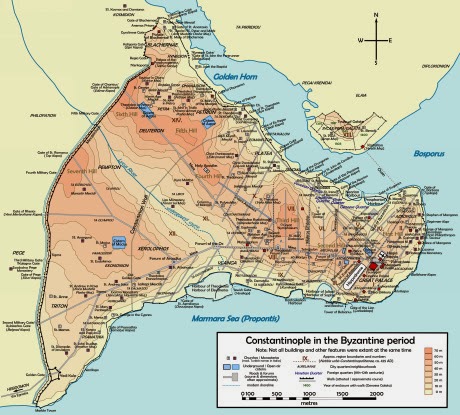BYZANTINE CONSTANTINOPLE
(Message by Tanny Keng)
1. Byzantine Constantinople
1. Byzantine Constantinople
a) Constantinople was originally founded as a Greek colony under the name of Byzantium in the 7th century B.C. It is located in a strategic geographic position which is between the Golden Horn and the Sea of Marmara at the point where Europe meets Asia. Any enemy wishing to conquer the city would have to possess both a strong army and strong navy in order to take it. This militarily advantageous position would later prove critical to the eastern provinces of the old Roman Empire as a defense against the barbarian invasions of the 5th century A.D.
b) When Roman Emperor Constantine I came to power he wanted to transfer the Empire's capital away from Nicomedia (in Anatolia). After considering Sardica and Troy he choose Byzantium on the Bosporus as the new center of the empire. The Bosporus itself is about eighteen miles long and varies in width from about half a mile to a mile and a half.
c) One reason for Constantine's choice of the city was that, like Rome, it was built on seven hills. Byzantium's Hippodrome was built on the first of these hills. The forum of Constantine was built on the second. The Great Nymphaeum is on hill three. The Holy Apostles church is on hill four, with hill five and six right next to it. The city's fourth military gate rests on the seventh hill.
d) In 330 A.D., after six years of building the city, it was consecrated and officially made the Roman Empire's brand new capital. It was renamed Constantinople, in honor of Emperor Constantine, sometime after the death in 337 A.D.
e) According to Barnes Notes on the New Testament, one tradition states that sometime after Paul's friend and fellow evangelist Timothy's death his bones were moved to Constantinople.
2. Did you know about . . . ?
a) Constantinople was the world's principal Christian city before it fell to the Ottomans in 1453 A.D.
The End ...
b) When Roman Emperor Constantine I came to power he wanted to transfer the Empire's capital away from Nicomedia (in Anatolia). After considering Sardica and Troy he choose Byzantium on the Bosporus as the new center of the empire. The Bosporus itself is about eighteen miles long and varies in width from about half a mile to a mile and a half.
c) One reason for Constantine's choice of the city was that, like Rome, it was built on seven hills. Byzantium's Hippodrome was built on the first of these hills. The forum of Constantine was built on the second. The Great Nymphaeum is on hill three. The Holy Apostles church is on hill four, with hill five and six right next to it. The city's fourth military gate rests on the seventh hill.
d) In 330 A.D., after six years of building the city, it was consecrated and officially made the Roman Empire's brand new capital. It was renamed Constantinople, in honor of Emperor Constantine, sometime after the death in 337 A.D.
e) According to Barnes Notes on the New Testament, one tradition states that sometime after Paul's friend and fellow evangelist Timothy's death his bones were moved to Constantinople.
2. Did you know about . . . ?
a) Constantinople was the world's principal Christian city before it fell to the Ottomans in 1453 A.D.
b) The King James Bible of 1631 is referred to by some as the 'wicked' or 'adulterous' Bible due to an unfortunate printers error. Instead of the seventh commandment in Exodus 20:14 reading 'Thou shalt not commit adultery,' the word 'not' was missing which made the verse read 'Thou shalt commit adultery.' King Charles of England quickly found out about the error and had the translation recalled and destroyed. The printer who committed the error was heavily fined.


Comments
Post a Comment